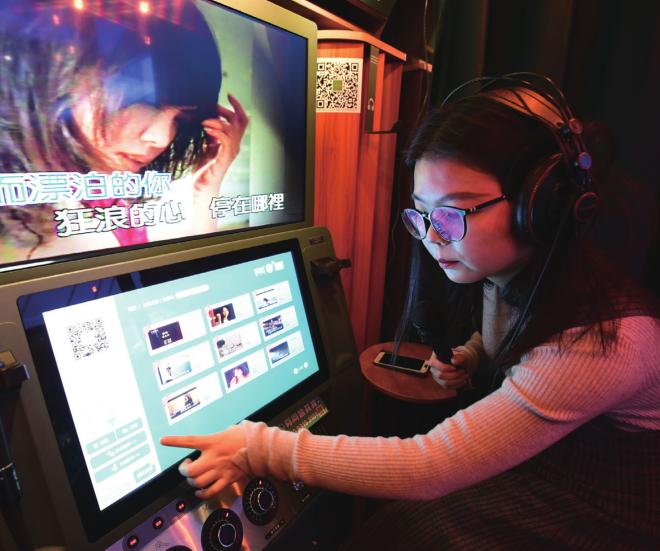Karaoke Businesses Struggle Amid Competition and Copyright Scrutiny
2019-03-05

Karaoke parlors, once an important driver for business and an important part of social gatherings, are facing trouble amid tightened copyright scrutiny and market competition.
The number of karaoke operators in the eastern city of Nanchang dropped to 140 in 2018, down 40 percent year on year, according to Gong Yongkang, head of the Jiangxi Provincial Culture and Entertainment Industry Association.
The southern metropolis of Guangzhou is experiencing a similar slowdown. Latest government data show the number of karaoke operators in the city was 500 in 2017, down from 600 a year earlier.
Annual revenue dropped to 680 million yuan ($100 million) in 2017 from 880 million yuan ($129 million) in 2015.
“The major problem stunting growth is the lack of an authorized music library,” said Li Xiaoji, deputy head of the Guangzhou Association of Culture and Recreation.
Karaoke, also known as KTV, was invented in Japan in the 1970s and introduced in China in the late 1980s. The form of interactive entertainment is a popular way of socializing across generations.
Most KTV providers offer between 30,000 and 50,000 songs. Manufacturers of karaoke machines obtain authorization from the China Audio-Video Copyright Association (CAVCA) in order to use the material.
Last October, CAVCA ordered all KTV businesses to remove more than 6,000 songs in a bid to crack down on copyright infringements. The move was met with criticism from karaoke fans and operators.
“I paid more than 100,000 yuan($1,470) each year in copyright fees to CAVCA and it suddenly asked us to remove so many songs, which greatly affected our business,” said a Guangzhou KTV runner.
“As I do not know exactly how the copyright process works, I removed far more than 6,000 songs to avoid any potential copyright lawsuits,” he added.
New business models are also challeng- ing the survival of the KTV industry.
Mobile Internet has transformed the industry with many young people opting for sing-along apps which they can use anywhere without visiting a KTV venue.
“Instead of being embarrassed when I sing in bars, I prefer to do it on mobile apps,” said Xiahou Jiaji, a woman from Xinyu in Jiangxi Province.
Another challenger to the traditional market is mini KTVs located in a soundproofed booth, which are especially popular with the younger generation. They are now commonly seen in shopping centers and theaters across the country.
The whole process, from selecting songs to making payments, can be done by scanning a QR code with a mobile phone. Customers can also record their performance and forward it to friends.
“The KTV business will not be replaced entirely but it has to be upgraded to meet the rising entertainment demand of consumers,” Gong said.
Li Xiaoji proposed the authorities establish a legitimate music library that can both protect the copyright and serve the interest of those who run KTVs.
Zhou Yaping, CAVCA acting Secretary General, said the association would promote the establishment of a legitimate music library and set up an effi cient charging model using big data and mobile payment technologies.
KTV businesses are trying to be innovative to survive. Some are organizing parties and some even combining KTV with hotpot, a popular communal way to cook and eat. As China is aging, a rising number of KTVs are eyeing the elderly who have both time and money.
Once the fi rst choice of entertainment for Chinas youth, KTV bars are now becoming a favored hangout of senior citizens. A room for 10, with free coffee and water, costs less than 100 yuan ($14.7) during the day at a Milo KTV branch in downtown Beijing.
Li Mingrui, a Milo KTV manager, said karaoke is an ideal pastime for Chinas aging society, whose demand may offer an economic solution for the countrys declining KTV industry.
